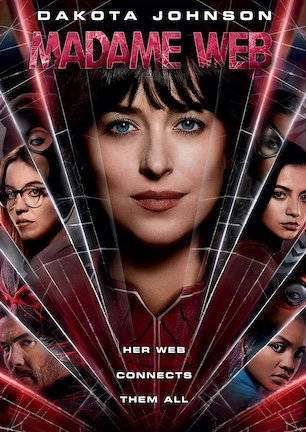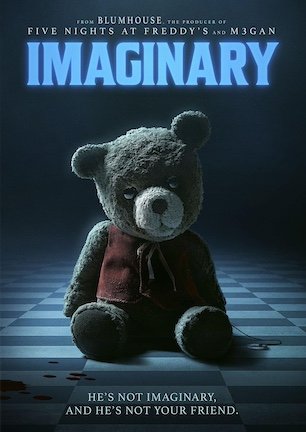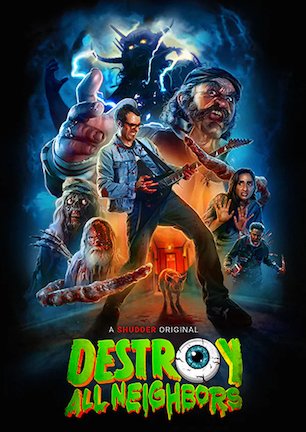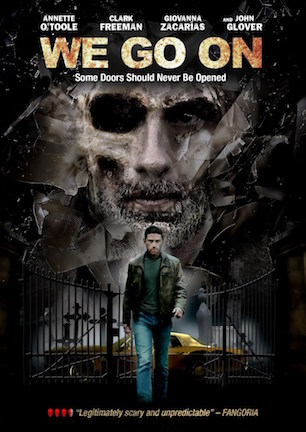Studio: Blumhouse
Director: Sophia Takal
Writer: Sophia Takal, April Wolfe
Producer: Jason Blum, Ben Cosgrove, Adam Hendricks, Brigitte Berman
Stars: Imogen Poots, Aleyse Shannon, Lily Donoghue, Brittany O’Grady, Caleb Eberhardt, Cary Elwes
Review Score:
Summary:
As masked men terrorize women across campus, sorority sisters uncover a shocking conspiracy connected to their university’s dark history.
Review:
Nothing would have pleased me more than to have ended up championing “Black Christmas” 2019. It’s what I wanted to happen, and what I honestly thought would happen too.
Like “Ghostbusters” 2016 and “Terminator: Dark Fate” (review here) before it, this third take on “Black Christmas” turned into a target of hateful trolling simply by being female led, driven, and focused. Online attacks became so awful that I had to stop clicking on articles and social media mentions of the movie pre-release because within minutes, comments became cesspools drowning in dozens of pointlessly cruel posts. Whether bots were to blame or just old-fashioned fragile masculinity, venomous volleys dominating “Black Christmas” discourse prominently featured phrases like “woke, PC, left-leaning, liberal, SJW,” or some other misappropriated buzzword followed by “garbage,” a noun more fitting for the useless opinion employing it.
Review bombers sunk the movie’s IMDb rating to 2.9 before it even premiered publicly. “F*ck you assh*les with nothing better to do than obsessively harangue a film,” I thought. I was going to actually see the movie, probably enjoy it, and then cut through the crap with an informed review that wasn’t based on errant assumptions, irrational anger, or an entitled attitude.
To my regret, that’s not what happened. Before any dickwad smirks, “I told you so,” let’s be crystal clear about something though. “Black Christmas” does not fail because it promotes feminist themes or dumbs down its thrills to have PG-13 appeal. It disappoints because it doesn’t do these things well, and those agendas mix like oil and water to create a mediocre mainstream movie without the edge it deservedly demands to have.
Dismissing “Black Christmas” for its pro-women pride is absurd for more reasons than can be covered here. At its most superficial level however, seeing the status quo shaken is a ridiculous fear for any filmgoer to have.
Like many genre fans, I’ve seen thousands of horror films over the course of my life. I’m now absolutely bored by the countless blah movies that fall back on formula, recycle redundancy, and default to the male gaze. Unsurprisingly, the most impressive endeavors in recent years have come from other countries, cultures, and especially women. I’m talking about films like “The Babadook” (review here), “The Invitation” (review here), and “Tigers Are Not Afraid” (review here). Why wouldn’t anyone burned out on routine be eager for underrepresented voices to show us new viewpoints, challenge our preconceptions, and broaden our entertainment spectrum with diverse stories, styles, and concepts?
It’s unfair to suggest director Sophia Takal and co-writer April Wolfe have to put a punctuation mark on any argument in a “cinematic gender roles” conflict. Or to say that any single project of theirs must be nothing less than impressive in order to meet inflated expectations. As with any artists, they are free to create what they want without inheriting an additional performance burden on the basis of being women.
Yet when something such as “Black Christmas” 2019 sets out to specifically tackle hot button topics, and doesn’t meaningfully advance those discussions, it subjects itself to relevant criticism. Underwhelmed reactions may ask, if the film’s chief impression is of being a beige slasher trading on tropes instead of seizing its platform to truly chew on social commentary while carving a unique niche, how much does it matter who tells the story or why?
Hawthorne College student Riley serves as our steward through “Black Christmas.” Riley’s introduction takes her from her sorority house’s top floor to the front door as she runs a gauntlet of people, props, and telegraphed exposition that of course figures heavily into the film. If you aren’t already paying attention to the items passed to her sorority sisters, close-up cutaways will confirm their eventual importance. The only question regarding a noisy Santa decoration with a malfunctioning motion detector is if it will startle a heroine or an attacker during a confrontation now confirmed to take place later in this location. This isn’t the last time “Black Christmas” paints on five thick coats with single brush strokes.
It shouldn’t be a spoiler to say Riley’s arc evolves her from reticent rape survivor to resiliently courageous badass. Until a woefully weird turn in the third act, predictability remains a persistent problem for staging. That goes for technical craft as much as it does for the fiction.
From its “girl walks home alone worried about a decoy stalking behind her” prologue to yet another finale where a building burns up in flames, the scent of “been there, done that” wafts over every other scene, and not because “Black Christmas” builds off two namesakes. Standard scares include a hand on the shoulder tag, someone falling in the foreground to reveal the surprise killer behind him, and a Xeroxed recreation of “Exorcist III’s” legendary hallway cut.
Too plain to stand out solely as a slasher, “Black Christmas” makes its hay, and evidently its enemies, out of unsubtle subtext. It’s no surprise why misogynist men find the film infuriating. White supremacy, slavery, campus rape culture, consent, not believing women, institutionalized sexism, roofies, and taking advantage of inebriation all receive some kind of callout. Putting Cary Elwes’ professor in a sexual scandal with a student may be the only “usual suspect” target the movie missed.
But “Black Christmas” piles on so many skin-scratch indictments of patriarchal problems that it practically devolves into parody. When everything is presented as important, nothing is. Focus exclusively on a smaller handful of issues, instead of merely mentioning many of them in disposable dialogue as though running down a cursory checklist, and messages would have greater power. Without room to sufficiently map more routes than can be managed, forced flame-fanning stalls the film’s plot and its purpose rather than advancing either one.
SPOILERS
“Black Christmas” further damages its own case by ultimately sloughing everything off as part of a centuries-old supernatural conspiracy. Even as stereotypes, douche-y frat boys don’t need much accessorizing to be viable movie villains. An average news cycle about hazing deaths and sexual assault already puts that picture in many minds. So why let them even partially off the hook by suggesting their bad behavior can be chalked up to paranormal possession rooted to the university’s evil founder?
Only one man in the movie, Landon, can consistently be considered a “good guy.” Marty’s boyfriend Nate does okay for awhile, then suddenly gets snippy while helping to put up a Christmas tree. He goes on to have a wild blowout with three of the women not long after an “I like beer” comment likening him to Supreme Court stooge Brett Kavanaugh. It’s a harsh sentence to saddle on an otherwise okay character. Subsequent revelations about mind-control migraines then seemingly excuse Nate’s actions as “not his fault” which, again, is an implication counterproductive to the movie’s overall M.O.
END SPOILERS
Coming on so strong and also subjugating subtext to silliness permits people to tune out the movie’s heavy-handed messaging by dismissing it as cartoonish “feminist fantasy.” And those are the people who need to hear that message the most. If commentary only speaks to its choir, how much does context matter when the collective conversation’s needle doesn’t significantly move? Riley’s oddly prophetic line, “we’re not inspiring people, we’re pissing people off” becomes true of “Black Christmas” too. That’s a sad result for a project whose idealistic intentions are drowned out in the din of a poor commercial reception.
I’m regrettably realizing that the older I get, the harder it is to imagine looking through someone else’s eyes. I have a fear of eventually turning into an irrelevant old man with unwaveringly antiquated beliefs like certain iconic celebrities who shall remain nameless. I don’t think I’m irrevocably set in all of my ways yet. Still, I should stress that I am a straight white male born in the late seventies. Obviously, that shapes my personal perspective. And that particular perspective should be seasoned with two grains of salt since I belong to the demo being justifiably skewered by the movie, which seems to be the same demo giving “Black Christmas” its grief. I’m fine with the former, but I definitely do not associate with the latter.
To compensate, particularly if this happens to be the first “Black Christmas” 2019 review you’ve read, I encourage soaking in at least one woman’s coverage, perhaps an interview with the director too. I’ve seen other takes praising “Black Christmas” for bravely promoting female empowerment, especially among young girls and abuse survivors who don’t see themselves or their stories reflected onscreen often. I disagree that the film does this effectively, but I don’t belong to those audiences, so I’m far from a convincing authority on the subject.
I genuinely hope I can look back at this review after enough time has passed and be embarrassed that I had an unfavorable opinion potentially based on typical male takes I was incapable of seeing through. Currently, I doubt that’s going to happen, yet nothing would please me more. Well, appreciating “Black Christmas” 2019 out of the gate would have. But the outcome I wanted is not the outcome I got.
NOTE: There is a brief post-credits scene.
Review Score: 45







If you want to see impossible amounts of blood explode crimson colors like the world’s worst version of a gender reveal, well, “Abigail” at least has that.